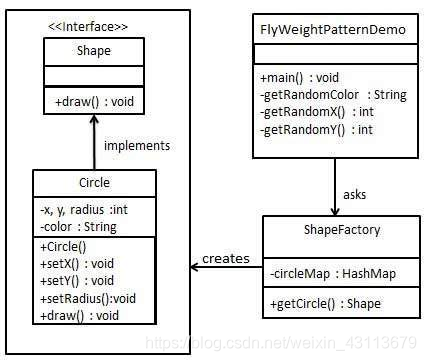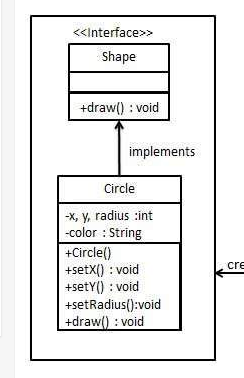主要用于减少创建对象的数量,以减少内存占用和提高性能
尝试重用现有的同类对象,如果未找到匹配的对象,则创建新对象
换句话说就是共享对象,在某些对象需要重复创建,且最终只需要得到单一结果的情况下使用
菜鸟案例:
我们将创建一个 Shape 接口和实现了 Shape 接口的实体类 Circle。下一步是定义工厂类 ShapeFactory。
ShapeFactory 有一个 Circle 的 HashMap,其中键名为 Circle 对象的颜色。无论何时接收到请求,都会创建一个特定颜色的圆。ShapeFactory 检查它的 HashMap 中的 circle 对象,如果找到 Circle 对象,则返回该对象,否则将创建一个存储在 hashmap 中以备后续使用的新对象,并把该对象返回到客户端。
FlyWeightPatternDemo,我们的演示类使用 ShapeFactory 来获取 Shape 对象。它将向 ShapeFactory 传递信息(red / green / blue/ black / white),以便获取它所需对象的颜色。
重点:减少重复对象的创建,没有再创建,有就可以用有的对象
图例还是需要分开看,再进行合并

很正常的Shape接口和它的一个实现类Circle
mian方法就是执行的头,里面还有三个方法,就是颜色,X,Y
这它创建了一个工厂,工厂里有一个成员属性,是个HashMap,里面肯定存的是Shape了,
getCircle() 获得的Shape就是HashMap里的Shape了,它这既然说是减少创建重复对象,大概就是把Shape存进HashMap里,等用到Circle时就把它取出来返回,没有就重新建一个,当然根据这个图例和介绍和下面代码的结合,HashMap的key是color,根据颜色来判定此颜色的Circle是否存在
上代码
(1)创建一个接口。
Shape.java
public interface Shape {
void draw();
}
(2)创建实现接口的实体类。
Circle.java
public class Circle implements Shape {
private String color;
private int x;
private int y;
private int radius;
public Circle(String color){
this.color = color;
}
public void setX(int x) {
this.x = x;
}
public void setY(int y) {
this.y = y;
}
public void setRadius(int radius) {
this.radius = radius;
}
@Override
public void draw() {
System.out.println("Circle: Draw() [Color : " + color
+", x : " + x +", y :" + y +", radius :" + radius);
}
}
上面都是正常操作,没什么
(3)创建一个工厂,生成基于给定信息的实体类的对象。
ShapeFactory.java
import java.util.HashMap;
public class ShapeFactory {
//HashMap把颜色当key
private static final HashMap<String, Shape> circleMap = new HashMap<>();
public static Shape getCircle(String color) {
Circle circle = (Circle)circleMap.get(color);
//没有相同颜色的就创建个新color的Shape存进HashMap
if(circle == null) {
circle = new Circle(color);
circleMap.put(color, circle);
System.out.println("Creating circle of color : " + color);
}
return circle;
}
}
(4)使用该工厂,通过传递颜色信息来获取实体类的对象。
FlyweightPatternDemo.java
public class FlyweightPatternDemo {
private static final String colors[] =
{ "Red", "Green", "Blue", "White", "Black" };
public static void main(String[] args) {
//随机创建20个circle,
for(int i=0; i < 20; ++i) {
Circle circle =
(Circle)ShapeFactory.getCircle(getRandomColor()); //颜色随机
circle.setX(getRandomX());
circle.setY(getRandomY());
circle.setRadius(100);
circle.draw();
}
}
private static String getRandomColor() {
return colors[(int)(Math.random()*colors.length)];
}
private static int getRandomX() {
return (int)(Math.random()*100 );
}
private static int getRandomY() {
return (int)(Math.random()*100);
}
}
执行程序,输出结果:
Creating circle of color : Black
Circle: Draw() [Color : Black, x : 36, y :71, radius :100
Creating circle of color : Green
Circle: Draw() [Color : Green, x : 27, y :27, radius :100
Creating circle of color : White
Circle: Draw() [Color : White, x : 64, y :10, radius :100
Creating circle of color : Red
Circle: Draw() [Color : Red, x : 15, y :44, radius :100
Circle: Draw() [Color : Green, x : 19, y :10, radius :100
Circle: Draw() [Color : Green, x : 94, y :32, radius :100
Circle: Draw() [Color : White, x : 69, y :98, radius :100
Creating circle of color : Blue
Circle: Draw() [Color : Blue, x : 13, y :4, radius :100
Circle: Draw() [Color : Green, x : 21, y :21, radius :100
Circle: Draw() [Color : Blue, x : 55, y :86, radius :100
Circle: Draw() [Color : White, x : 90, y :70, radius :100
Circle: Draw() [Color : Green, x : 78, y :3, radius :100
Circle: Draw() [Color : Green, x : 64, y :89, radius :100
Circle: Draw() [Color : Blue, x : 3, y :91, radius :100
Circle: Draw() [Color : Blue, x : 62, y :82, radius :100
Circle: Draw() [Color : Green, x : 97, y :61, radius :100
Circle: Draw() [Color : Green, x : 86, y :12, radius :100
Circle: Draw() [Color : Green, x : 38, y :93, radius :100
Circle: Draw() [Color : Red, x : 76, y :82, radius :100
Circle: Draw() [Color : Blue, x : 95, y :82, radius :100
看到上面就知道虽然输出了20次圆的数据,但是只创建了5次Circle,在ShapeFactory,还是关于颜色不同原因创建的,和X,Y无关
还有一点注意的:看这个例子就知道,享元模式一般是和工厂模式一起的
来源:https://blog.csdn.net/weixin_43113679/article/details/99459703